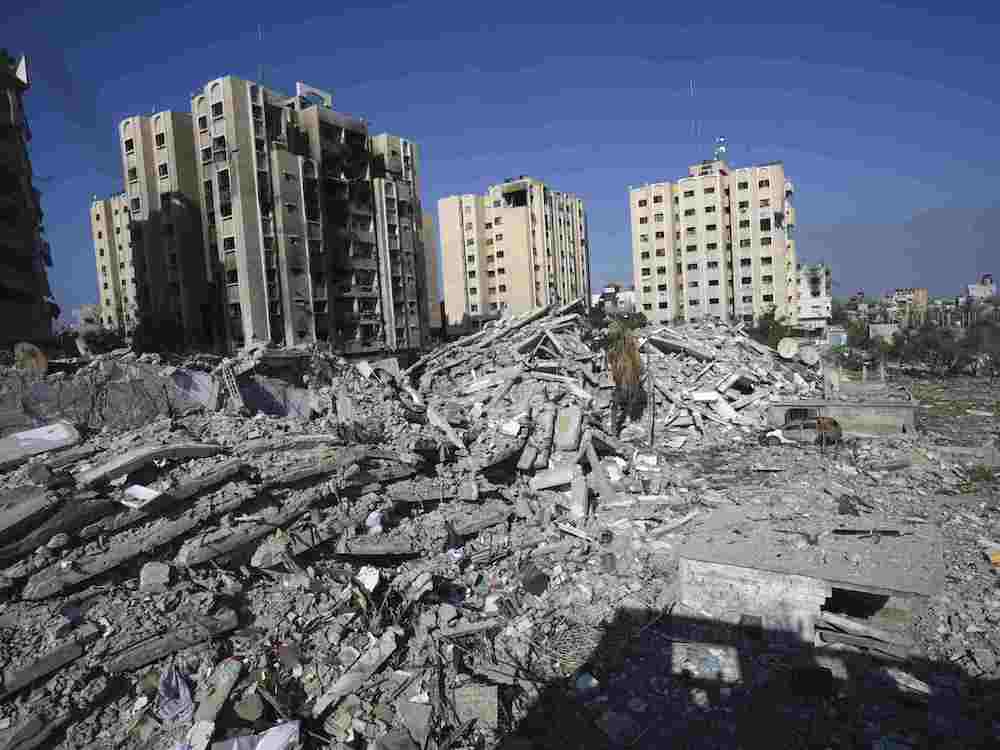The war in Gaza is now well into its second 100 days. Whatever the Israel Defence Forces do in Gaza, the government of Prime Minister Benjamin Netanyahu is already losing the support of Israel’s friends around the world. His government’s chief tactic seems to be to continue the strategy that Hamas exploited in its Oct. 7 attacks, and to convert the conflict into a forever war.
The charge of genocide is just one example of Netanyahu’s failure. I have read South Africa’s 84-page application to the International Court of Justice in The Hague, Netherlands, and I have read the 74 pages of rebuttals by the team of Israel’s defenders.
The ICJ hearings mean that Israel still has enough concern for world opinion to defend its actions in Gaza, rather than ignoring South Africa and other critics of the war. Canada has said we will abide by the court’s decision. But whatever the ICJ decides, Israel has put itself and its friends in an impossible position.
Both sides argue their cases with passion and complex legal reasoning. Both sides tend to skip evidence that weakens their argument, and to dismiss the other side’s evidence. The most striking example of that is the team of Israel’s defenders when they shrug off Israeli politicians’ violent anti-Palestinian rhetoric: “Sometimes statements are made which are ‘nothing more than a part of the recent war-time rhetoric intending to put the blame and shame on the other side.’ Not to be totally ignored, but not to be ascribed an importance which belies how and when they were made, nor of legal significance.”
‘War-time rhetoric’
Owen Jones, a columnist with the Guardian, presented some of that “war-time rhetoric” from major government officials:
- Israel’s president, Isaac Herzog: “It is an entire nation out there that is responsible. It’s not true this rhetoric about civilians not aware, not involved. It’s absolutely not true.”
- Israel’s minister of defence, Yoav Gallant: “We are fighting human animals and we are acting accordingly.”
- Israel’s Maj.-Gen. Ghassan Alian: “Human animals are dealt with accordingly. Israel has imposed a total blockade on Gaza, no electricity, no water, just damage. You wanted hell, you will get hell.”
It appears that Alian’s hell was carefully planned in the aftermath of Israel’s 2006 war against Hezbollah. Israeli forces attacked Hezbollah forces in Dahiya, a southern suburb of Beirut, so thoroughly that Hezbollah’s forces were rendered ineffective. They had lost the infrastructure they relied on to sustain combat.
By 2008, Israeli analysts in the Institute for National Security Studies, a Tel Aviv think tank, had developed a doctrine to guide the Israel Defence Forces in future wars:
“With an outbreak of hostilities, the IDF will need to act immediately, decisively, and with force that is disproportionate to the enemy's actions and the threat it poses. Such a response aims at inflicting damage and meting out punishment to an extent that will demand long and expensive reconstruction processes. Israel's test will be the intensity and quality of its response to incidents on the Lebanese border or terrorist attacks involving Hezbollah in the north or Hamas in the south.
"In such cases, Israel again will not be able to limit its response to actions whose severity is seemingly proportionate to an isolated incident. Rather, it will have to respond disproportionately in order to make it abundantly clear that the State of Israel will accept no attempt to disrupt the calm currently prevailing along its borders. Israel must be prepared for deterioration and escalation, as well as for a full-scale confrontation. Such preparedness is obligatory in order to prevent long-term attrition.”
In principle, such a doctrine is supposed to be a deterrent, a guarantee of peace. The same was true of the Cold War strategy of mutual assured destruction, better known as MAD: the United States and the Soviet Union avoided direct confrontation because they knew war would be catastrophic for both countries — and of course for the rest of the world.
When deterrence fails
But Hamas was not deterred, and Israel found itself with no choice but a horribly disproportionate response. Writing in the Israeli newspaper Haaretz, Uri Bar-Joseph, professor emeritus in international relations at the University of Haifa, has argued that the failure to deter was only part of a disastrously misguided security policy.
That policy, Bar-Joseph says, involved three elements: deterrence, early warning and quick victory. Israel’s military power and readiness would deter most threats. If deterrence did fail, Israeli intelligence would provide early warning of any serious attack. That would enable the IDF to achieve a quick, decisive victory. This policy had worked well in most previous wars.
But it failed in the 1973 Yom Kippur War, Bar-Joseph says, and failed again, disastrously, on Oct. 7, 2023. Hamas understood what the Israeli government was capable of doing, and not only was it undeterred, but its fighters openly trained within sight of Israeli military intelligence. But reports were dismissed by senior Israeli intelligence officers, so no early warning was heeded.
Finally, no quick, decisive victory seems possible. Israel defeated the armies of Egypt, Jordan and Syria in six days in 1967. Against perhaps 12,000 surviving Hamas fighters, the IDF is waging a slow war of attrition — precisely what the Dahiya doctrine was supposed to prevent.
Hopeless war goals
Netanyahu has promised Israel will fight indefinitely to “total victory,” defined as “eliminating Hamas, returning all of our hostages and ensuring that Gaza will never again constitute a threat to Israel.” He has also asserted that Israel after the war must control everything from the Jordan River to the sea — ironically appropriating a Palestinian slogan.
But the war has already expanded to western Yemen, controlled by the Houthi faction that has been lobbing missiles and drones not only at Israel but at Red Sea shipping the Houthis consider linked to Israel. In response, the United States and United Kingdom (with some Canadian support) have been attacking Houthi resources.
Meanwhile, U.S. forces in Syria are taking fire from Iran-backed militias. And now Iran is firing missiles into Pakistan, supposedly to punish a Sunni Muslim group called Jaish al-Adl. If Gaza ever ceases to be a threat to Israel, plenty of others will volunteer for the job.
Netanyahu’s fantasy of “total victory” would only set the scene for another war in a few years. He would not get all of the hostages back, and the threat to Israel’s security would be numerous Arab and other Muslim nations, not just Gaza. His disproportionate assault on Gaza has bitterly divided not only those in Israel, but many other countries’ citizens.
Maddeningly, Netanyahu has revived antisemitism on a horrifying scale, making Jews in other countries — even the United States and Canada — feel as insecure as Israel’s people. Israel was founded to give the survivors of the Holocaust a country where they could at last be safe. On Netanyahu’s watch, that purpose has utterly failed.
Netanyahu has made it clear that 21st-century war is too important to be left to the combatants. China, among other countries, has called for an international conference to push Israel and the Palestinians to a ceasefire and then “to urgently push the Palestinian and Israeli sides to resume peace negotiations and set a detailed timetable and road map.”
Obviously Beijing would enjoy exerting its influence, but that influence could be balanced if the United States, Canada and other allies of Israel agree to do some pushing too.
Losing to win
A successful conference would result in serious negotiations and the establishment of a Palestinian state. Both sides would have to give up a great deal.
The Charter of the United Nations forbids its members to annex land they have occupied; the illegal settlers in the West Bank would have to move back within Israel’s 1967 borders, leaving their settlements to the Palestinians. Netanyahu’s government, with no hope of “total victory,” would have to deal with Hamas or its successors. Netanyahu would likely be out of power before or shortly after a deal was reached.
The Palestinians would abandon the “right of return” to the homes they lost in the ethnic cleansing of 1948. They would have to commit to some kind of mutual non-aggression pact with Israel. With little or no Israeli help, they would have to found a Palestinian republic while rebuilding Gaza, reclaiming the West Bank and caring for a traumatized and mutilated generation of children.
Both sides will lose the war, but a two-state solution would enable both to win the peace. Adopting such a settlement in 1948 would have saved the world 75 years of misery and violence, but it’s pointless now to assign blame for that failure. What matters is that Palestinians and Israelis live side by side as equals, if not as friends, knowing their own security depends on the security of their neighbours.
If they can do that, it won’t matter if Israel is technically committing genocide or not; whatever it is, it must stop at once, and Netanyahu must be replaced to clear the way for wiser government. It won’t matter if Hamas still wants to destroy Israel; it will not be able to do so, if its onetime supporters are willing to gamble on peace instead of still more decades of violence. ![]()
Read more: Rights + Justice, Politics

















Tyee Commenting Guidelines
Comments that violate guidelines risk being deleted, and violations may result in a temporary or permanent user ban. Maintain the spirit of good conversation to stay in the discussion and be patient with moderators. Comments are reviewed regularly but not in real time.
Do:
Do not: